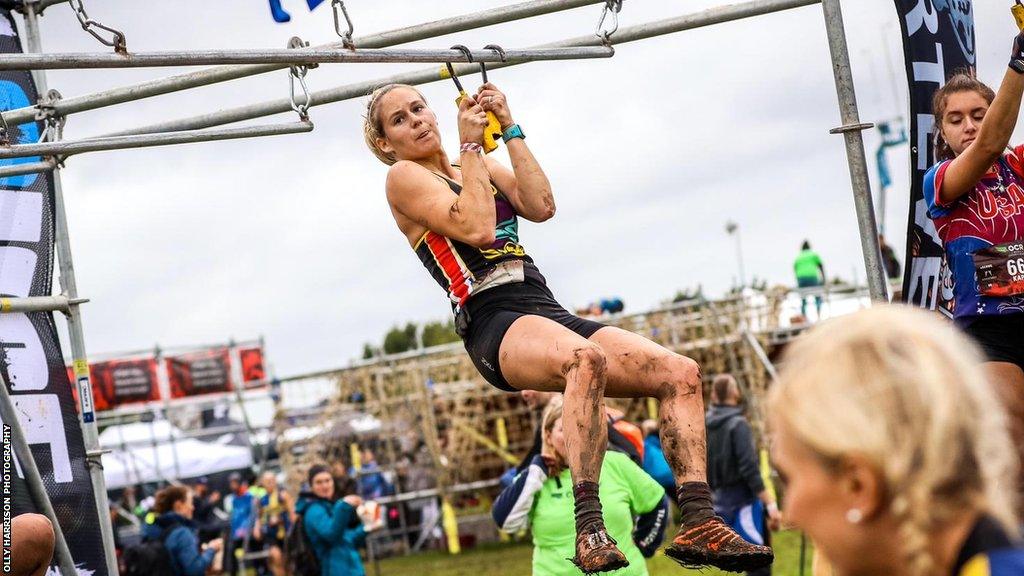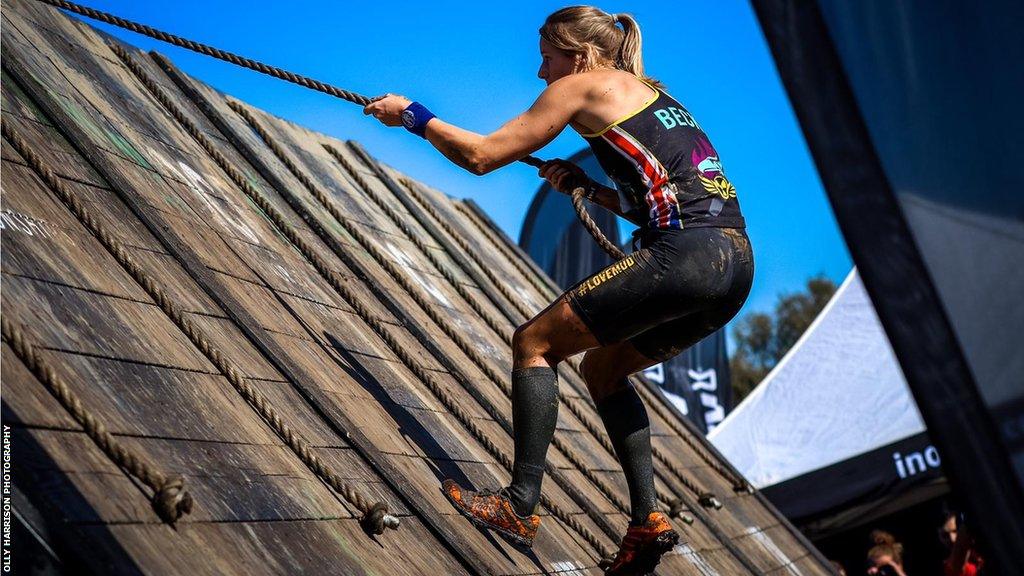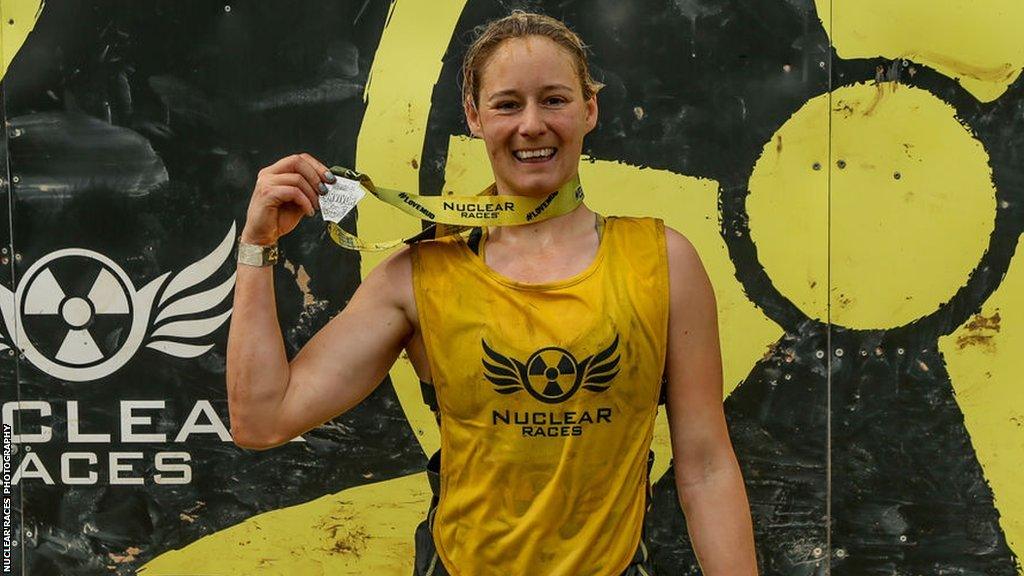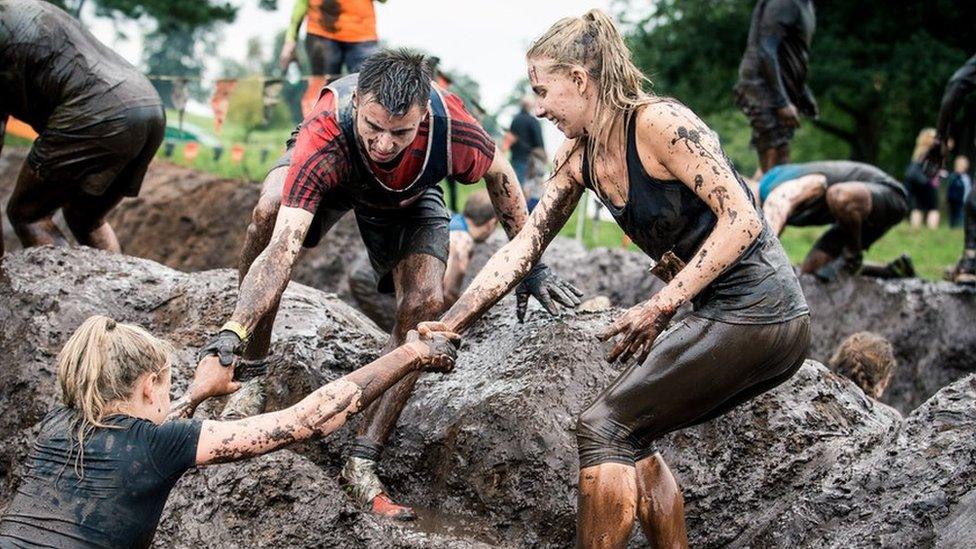Obstacle course racing: Welcome to the world of a growing sport with Olympic ambitions
- Published
Team UK obstacle course racing vice-captain, Becky Neal chats to BBC South sports editor Lewis Coombes.
"It's early in the morning and you're on the start line with a group of fierce-looking women getting ready to charge at a bunch of obstacles - you know it's going to be a rollercoaster."
Becky Neal is describing the world of obstacle course racing (OCR), a sport in which the athlete that can run, jump, crawl and scramble over a series of stubborn apparatus the fastest wins.
Competitions are tough and unforgiving due to the sheer levels of fitness needed to race over the unpredictable environment where courses are built.
Mud and sweat is guaranteed - the tears are optional.
"It challenges your entire body and mind," Neal told BBC Sport.
"I did an event at Everest base camp where one of the obstacles involved carrying a 20kg sandbag.
"The altitude meant you had half the oxygen, it was freezing at -15ºC and I had been trekking over rough terrain.
"When it gets tough, you just have to find another part of you to push on and make it happen."
Obstacle course racing has been growing in popularity for a number of years and there are now lots of well-organised mud-soaked and energy-sapping events organised for people looking for an adventurous alternative to the gym and their weekly long run.
Events take place all over the world, from sprawling urban city centres to farms in the countryside, and scenic mountainous landscapes to stifling deserts.
Distances and difficulty are varied.
Whether you are an explosive athlete, nimble speedster or endurance specialist, what is on offer is guaranteed to push your body to the limit and possibly make you question your decision to get out of bed and even turn up on the start line.
"It's difficult but it's always exciting," added 31-year-old Neal from Poole, in Dorset.
"My first race was six years ago. I just turned up with no expectations, got stuck in and I was hooked.
"The sport is so varied, it's always changing and overcoming the obstacles is really rewarding.
"It's actually quite fun to just play on the equipment and it feels less pressured than other competitive sports."

Becky Neal (centre) was selected to become the vice-captain of the UK obstacle racing team for the 2023 European and World Championships
'You have to dig deep'
Over time the sport has steadily evolved and there is now a more elite and competitive side of OCR.
The best UK athletes travel across Europe to take part in events through the spring and summer months, and there are also a small number of winter races for the battle-hardened who enjoy the cold and frosty mornings.
Whilst many race as individuals, others represent a local club or their country.
Neal represents a club and the UK national team, and so far this season she has already scooped a handful of winners' trophies and medals.
"Winning competitive races is really satisfying and I like to challenge myself around all the different obstacles," she added.
"I really like ones that you have to swing through and then release yourself flying through the air and then catch on to something again.
"The hardest ones for me are the heavy carries.
"During an elite tour event in Scandinavia I had to pick up a 60kg (132lbs) ball from the floor, to shoulder height and put it on a table.
"The ball was heavier than me so luckily we only had to do it once.
"Obstacle course racing tests everything, there is a lot of grit and determination involved, especially when the weather is bad.
"When you come up against something that you think you can't do it can be daunting, but that makes it even more satisfying when you overcome it.
"You just have to dig deep and find everything you've got to overcome the obstacles before you."

Neal says you need good endurance, grip strength, body control, grit and determination to overcome the challenges of the sport
Neal was selected to be Team UK's vice-captain for the 2023 obstacle course racing European and World Championships.
Her squad recently travelled to Hungary for the Euros, which is one of the main events targeted by the best obstacle course racers who have to come through national trials to get selected.
Around 1,500 athletes - women and men - from 31 countries battled it out across four different events - 100m sprint course, 3km, 12km and team relay - in search of silverware.
The UK team won a number of medals across the different disciplines and age group categories.
Olympic ambitions for OCR: 'We are aiming high'
The World Championships and Spartan Race are two other big events on the OCR calendar that attract the sport's best elite athletes.
But Neal and a group of volunteers from the obstacle racing community have their eyes set on something even bigger.
"We want OCR in the Olympics one day for sure," she said.
"But until it is recognised as a sport, which it isn't yet, it's difficult to reach that goal."

When Neal isn't training, racing and raising the profile of OCR she is a senior lecturer in exercise physiology and programme leader for Bournemouth University's Sport and Exercise Science degree
OCR seems to be trending in the right direction though.
The sport is set to replace the fifth event in the modern pentathlon - which is currently equestrian - at the 2028 Olympics in Los Angeles, if the discipline is included.
It is a controversial move which has angered traditionalists but the governing body of modern pentathlon, the Union Internationale de Pentathlon Moderne (UPIM), has said the discipline needs to modernise and that OCR is "dynamic and attractive to global audiences with a safe infrastructure".
Neal is hopeful OCR could one day be included in the Olympics as a standalone sport in its own right if participation numbers can continue to grow.
"We don't want it to stop at modern pentathlon," she said.
"There is already a group of dedicated volunteers at British Obstacle Sports, external who are developing policies to get OCR closer to Olympic consideration.
"But not everyone is into the competitive aspect of racing at the moment and that's one of the things holding us back.
"We need to keep supporting our local events, grow our top teams, get the national team going and grow OCR in schools and at university.
"We are aiming high."
- Attribution
- Published26 March 2017
